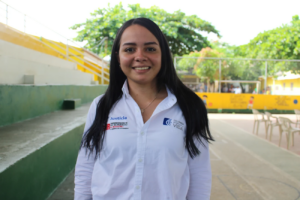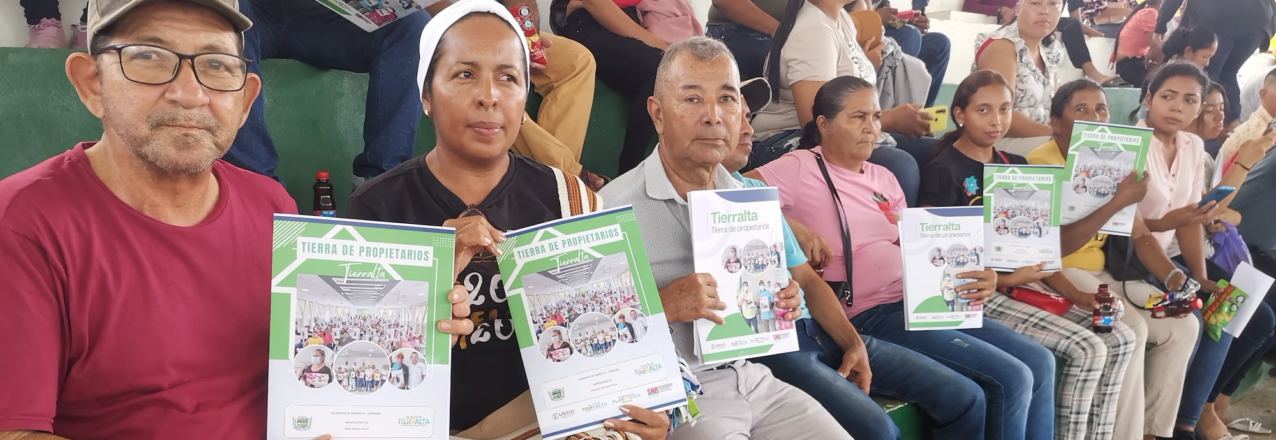Q&A with María José Muñoz, Land Formalization Expert from Colombia’s Property Registry (SNR)
 Since 2016, Colombia’s property registry authority, the Superintendence of Notaries and Registers (SNR) has worked with Municipal Land Offices (MLOs) to register and deliver thousands of land titles to owners all over the country. In this interview with María José Muñoz, Delegated Superintendent for the Protection, Restitution and Formalization of Land of the SNR, she talks about the importance of promoting land titling, how MLOs facilitate coordination with state entities and USAID’s role to support the process.
Since 2016, Colombia’s property registry authority, the Superintendence of Notaries and Registers (SNR) has worked with Municipal Land Offices (MLOs) to register and deliver thousands of land titles to owners all over the country. In this interview with María José Muñoz, Delegated Superintendent for the Protection, Restitution and Formalization of Land of the SNR, she talks about the importance of promoting land titling, how MLOs facilitate coordination with state entities and USAID’s role to support the process.
What does a Delegated Superintendent do and how do you coordinate work with Municipal Land Offices?
The Delegated Superintendent for the Protection, Restitution, and Formalization focuses on strengthening and supporting territorial entities with property and land formalization processes in the urban areas of a municipality. We are distributed across five regions where the SNR is providing legal and technical support to territorial entities with the administrative act of user ownership. As a delegate, what I do is coordinate work between the territorial entities and SNR’s regional property registry offices around the registration of an administrative act, which is how an urban property is delivered to the citizens of a municipality.
 What objectives and challenges do you have in the SNR?
What objectives and challenges do you have in the SNR?
The main objective is to have more Colombian landowners every day, and this is achieved through the support of territorial entities or territorial authorities that have signed agreements with us. This has been a challenge, which is why we try to impact more territorial entities, more municipal and departmental administrations, so that they can sign agreements with us and we can support them in that objective of making more Colombians landowners.
Does USAID’s coordination make the process faster?
USAID’s coordination is extremely important. As a third party, USAID supports the MLOs and the SNR. It is easier when we can count on the contribution of physical and institutional resources of an entity such as USAID, compared to when it is done directly between the territorial entity and the municipal administration. In the municipalities that have USAID support we can deliver a lot more land titles and the goals are achieved in a faster and more comprehensive way. A clear example of this is here in Tierralta where we have delivered more than 1,950 land titles since 2017.
In July 2023, Tierralta delivered 261 land titles. Why was that significant?
Of the 261 urban land titles, 179 were delivered to women. This means that almost 70% of the titles benefit women, and this is extremely valuable because historically, property in Colombia has benefited mostly men. In Tierralta, where the first pact was signed with the United Self-Defense Forces of Colombia (AUC) for the surrender of weapons and where historically there has been so much violence, the most vulnerable have always been women and children.
What does it mean for a woman to be a landowner?
It means that they are the legal owners of their homes. When a woman is the legal landowner, and the title is registered with the Registry Office, it gives her access to government programs and subsidies, for example for home improvements, also to a mortgage if she needs it, and her children can inherit the property for future generations. And of course, she is making sure that her children have a home which is protected by the government.
 How do Municipal Land Offices facilitate the work of the SNR?
How do Municipal Land Offices facilitate the work of the SNR?
They facilitate coordination, because it is very difficult to reach certain regions from the central level. I repeat, Tierralta is a great example because there is a Property Registration office close by in Montería, and this makes it easier for the staff of the MLO to coordinate with the SNR. Issuing an administrative act for the ownership of a property requires a lot of previous steps, including on-the-ground verification and the certification of historical titles that the municipal administration may or may not have. So it is very important that these teams are in the regions, because this could not be done from an office in Bogotá. This also increases the hiring of local employees, since they are the ones who know their region.
USAID has supported the SNR with the digitization of property registration files, how does this contribute to the efficiency of the SNR today?
There was a lot of money invested, but we are still missing a significant amount of files. I recently spoke with some registrars who benefitted from USAID’s Land for Prosperity Activity in Santander de Quilichao and Puerto Tejada in Cauca, and they mentioned the advantage of having the files not only digitized but also indexed. This allows them to search within a PDF file and not have to be exposed to a dusty physical file where they don’t know if they will find what they’re looking for.


